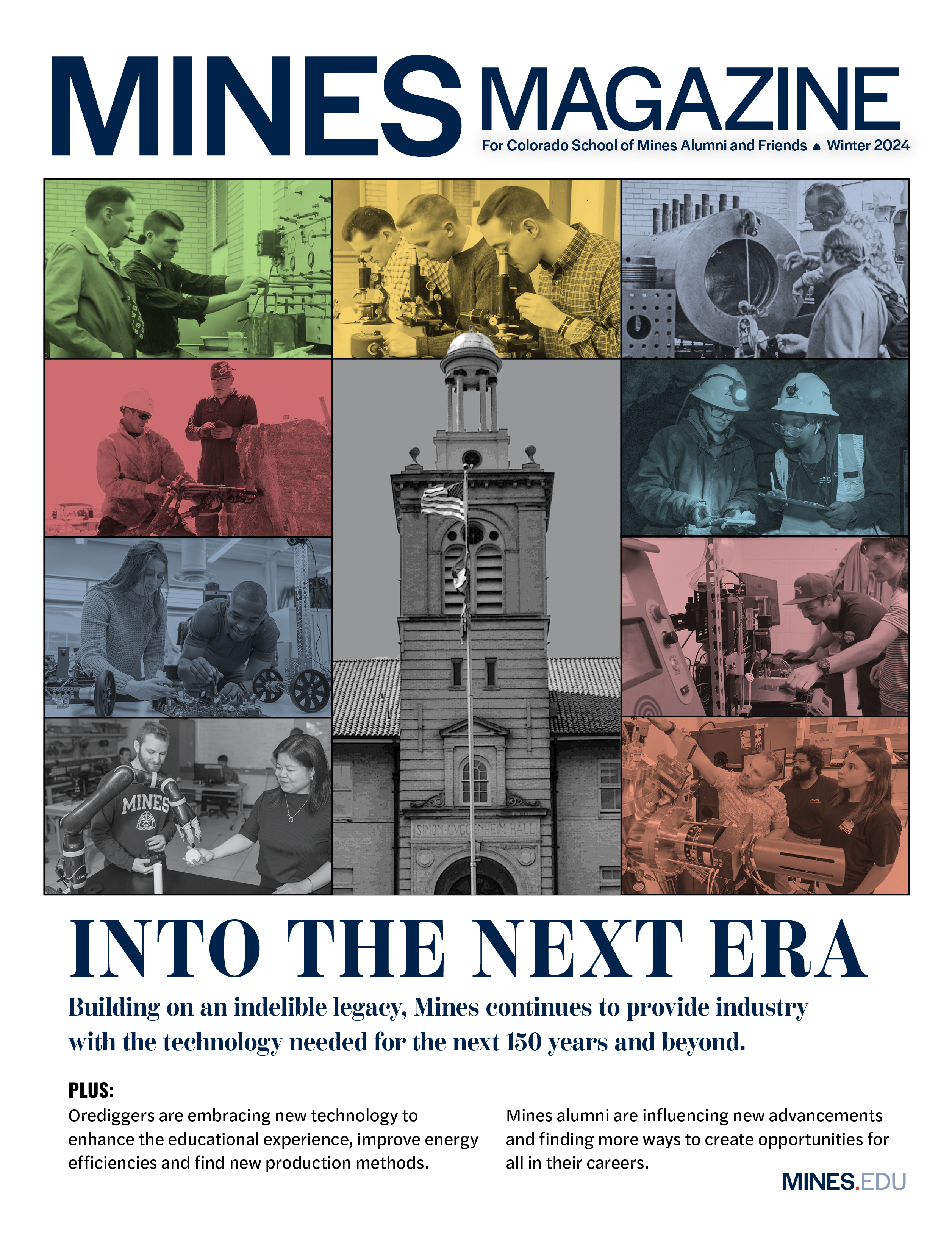The Oredigger Experience
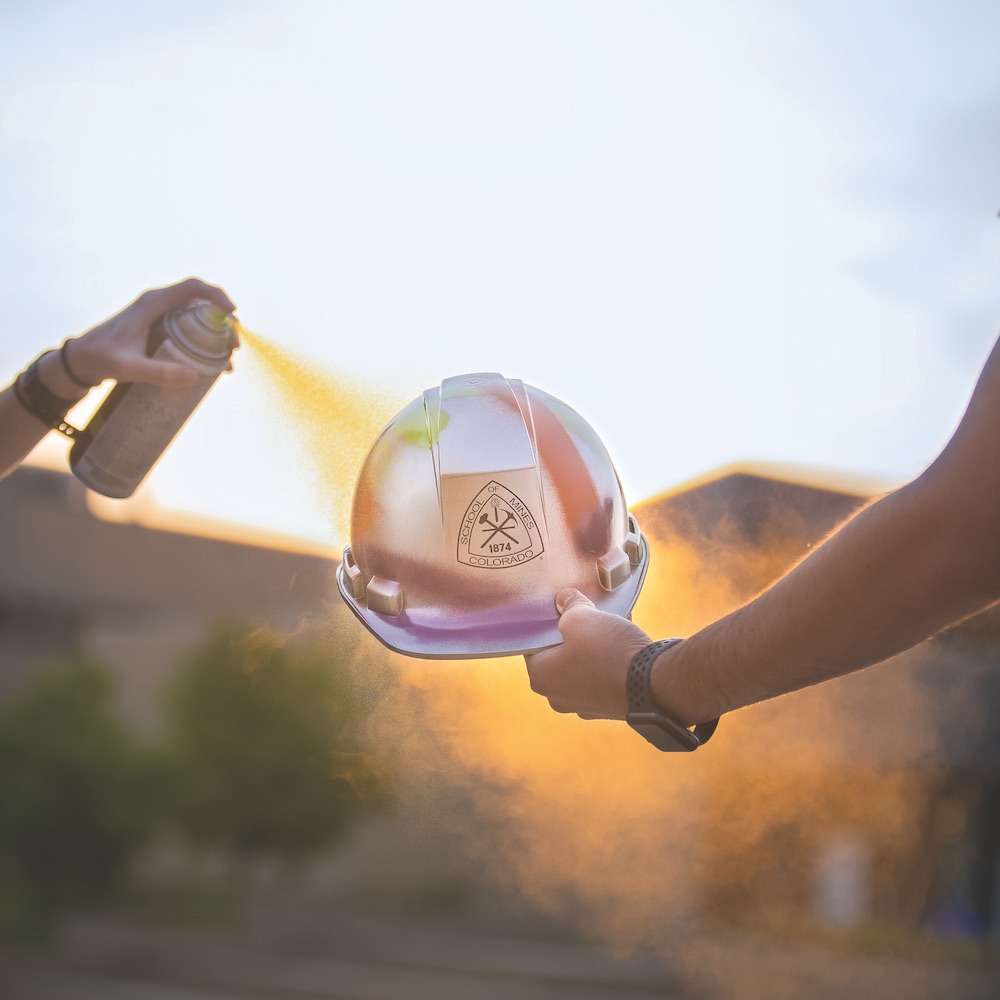
The Mines experience is different for every student as they bring their own unique interests, backgrounds and skill sets to campus. But there are also common signature experiences that support and shape every student’s journey, such as the connections formed between peers in the classroom, participating in Mines traditions, discovering new interests by joining or creating a club or organization on campus, finding support from others with similar backgrounds, being mentored by alumni and more. This time-tested framework supports and shapes every student who steps onto campus—and creates a signature student experience unlike any other.
We gathered five alumni to learn about their journeys through Mines and the experiences that helped shape them and made them proud to be an Oredigger. Here are their stories.
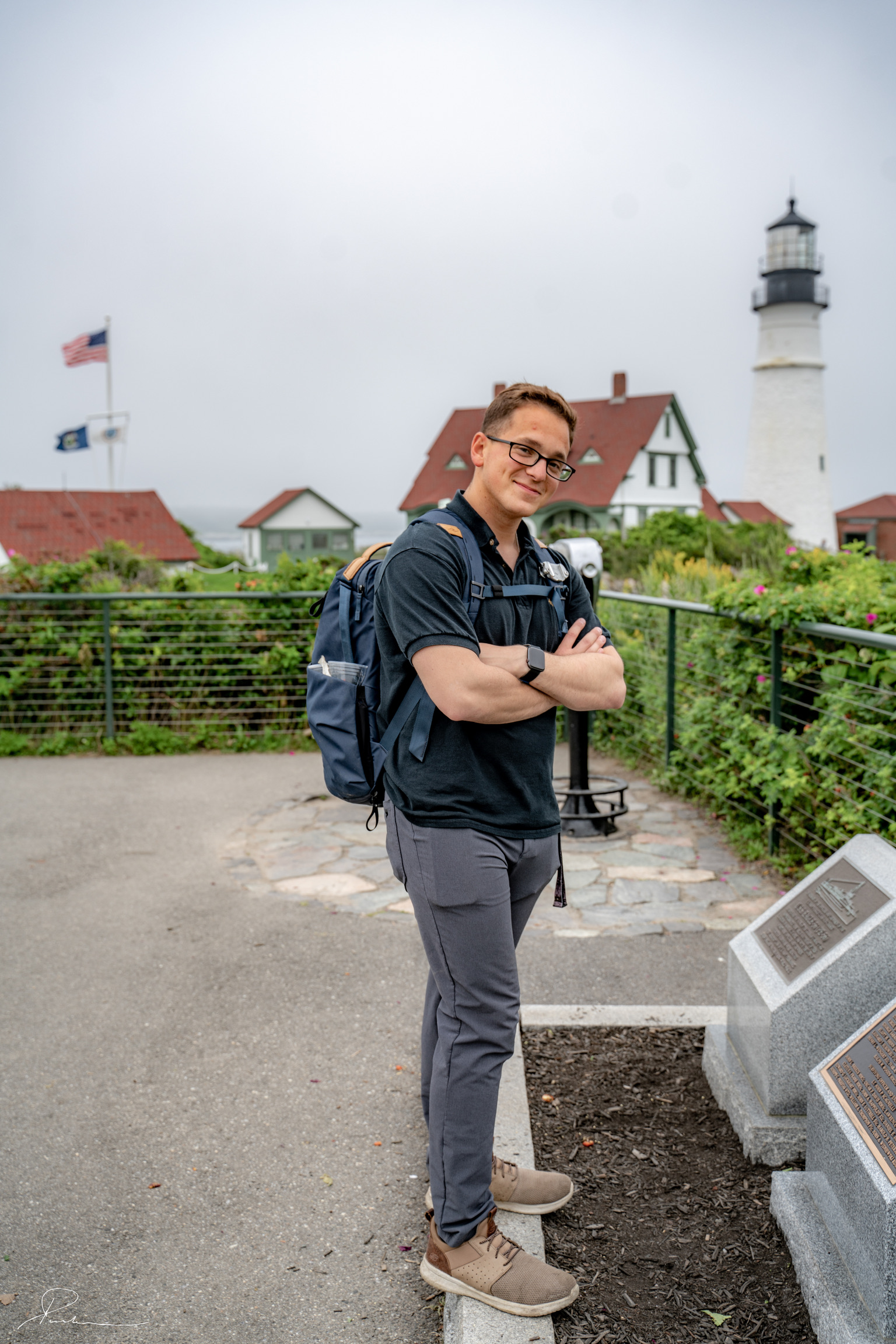
The one who tried a little bit of everything
Parker Bolstad ’19 wasn’t interested in having a straightforward Mines experience—he wanted to try out different interests, pursue experiences outside his comfort zone and gain skills beyond those learned in the classroom, all while gaining the rigorous education Mines is known for. But he also wasn’t your typical Mines student with aspirations to become a professional engineer—he had dreams of pursuing law and politics instead. So, for him, that just meant doing a little extra work to set himself on that path.
From day one at Mines, Bolstad set out to join clubs and organizations that pushed him beyond his science and engineering interests, something he had to be proactive about but was readily available at Mines. “Mines is a science and engineering school in a very literal sense,” Bolstad said. “That’s what many of the students want to do—it’s what they came to do, and it’s what they plan on doing afterward. Many people do activities that are entirely in the wheelhouse of their degree, but that worried me. I needed to make sure I did things outside my classwork that expanded my opportunities. That’s absolutely there at Mines—you just have to seek it out.”
He started out by joining the Ethics Bowl team, because he had enjoyed debate in high school. He joined the Pre-Law Society to gain skills, experience and connections for when he applies to law school in the near future. He joined ROTC and became a peer mentor to learn about leadership and service. And he joined the McBride Honors Program to round out his STEM education with a liberal arts skillset. “Because what I wanted to do was beyond just science and math, the other experiences were quite unique to me,” he said. “Even in high school, I did a lot of science and math, so things like Ethics Bowl and McBride opened up a world I hadn’t explored much before.”
Bolstad also took the same approach with his internships—he never applied to the same place twice. “I always tried to pick experiences that were going to be at least a little different than the one before, and I think each one of them was really useful for me in terms of broadening my horizons and developing myself,” he said.
Because of the wide range of experiences he had at Mines, Bolstad said he gained skills he still uses every day and can carry throughout the rest of his life. One of his most formative experiences was joining ROTC and being in charge of all operations for a battalion of 200 people in his senior year. “I was in charge of all the activities and all of the training exercises—it’s a lot to manage on top of your college schedule,” he said. “But the utility of that is I developed really strong time management skills, and I’m a lot more reliable and trustworthy. I’m a lot more confident and can approach new situations in better ways.”
The experiences Bolstad had outside the classroom were just as important—if not more so—than his time in the classroom because of how they shaped him and prepared him for life beyond Mines, especially now as a U.S. Army Intelligence Officer. “I learned a lot, made really good friends and good connections,” he said. “I grew a lot as a person and am far more confident in myself than I was when I first went to Mines. I think I excelled at the school in ways I never thought I could have. I don’t have many regrets.”
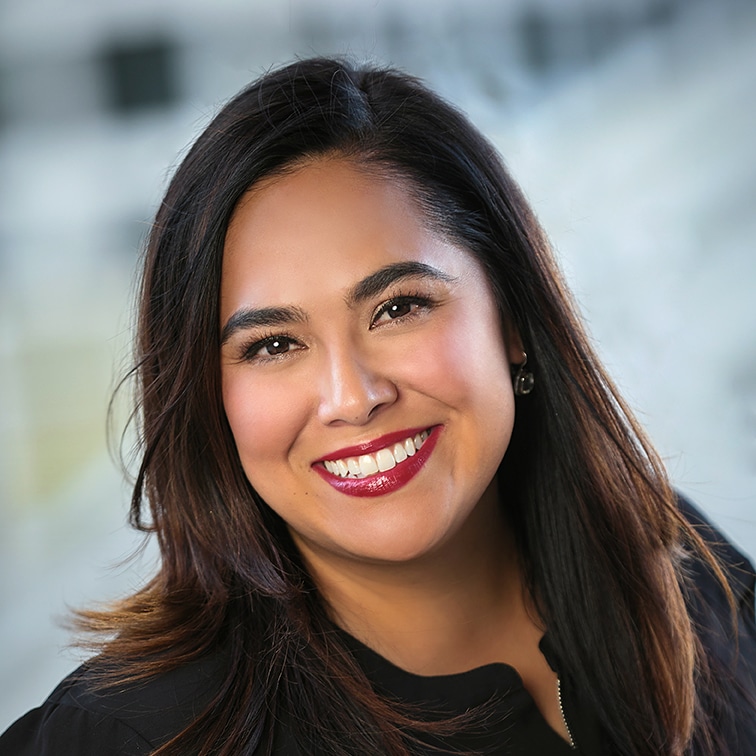
The one who wanted to make the world a better place and help others succeed
When Luz Falcon-Martinez ’05, MS ’09 first set foot on the Mines campus as a first-year student, she didn’t know where her path was going to lead or the kind of career she wanted to pursue. But she did know the intention she wanted to set for herself. “I knew I wanted to help people, and I knew that I wanted to make an impact and do what I could to make the world a better place,” she said. And for her, Mines seemed like the place where she could make that happen.
But Falcon-Martinez soon realized those goals might not be easily achieved after the first round of exams in her first semester at Mines didn’t turn out as well as she had hoped. She recognized that this journey—regardless of which major or field she ended up pursuing—was going to require more than solo late-night study sessions and attending professors’ office hours. She needed a stronger support network to help her through.
“Everybody who goes to Mines is very smart and relatively successful, so when you have your first failure, that’s a really hard thing to take on,” she said. “I figured out that I couldn’t do it alone and needed to branch out a bit and meet other people to get help through it. I’d been super involved in things growing up and in high school, and I thought that I didn’t need to do that in college. But I realized, no, you really do—you have to be part of something that’s bigger than yourself.”
She turned to organizations such as the Society of Women Engineers and the Multicultural Engineering Program for support and later had the opportunity to become one of the founding members of the Iota Zeta chapter of the Alpha Phi International Fraternity at Mines, all which helped her find her place within the Oredigger community and get the support she needed to thrive at Mines. “The leadership that was there was just amazing,” she said. “That was a really nice support group to have—to have a cheerleader to help you along the way.”
And joining those organizations was also a way for Falcon-Martinez to help others and make a positive impact on her community. “I also joined Alpha Phi Omega later on in my Mines years. Though the time was short, it was really special, because APO is based on providing service to others, which is something I hold dear,” she said. “Growing up, that’s something I’ve always done. Both of my parents taught me the importance of giving back to my community, whether that was spending Thanksgivings at different soup kitchens or my dad hosting a weekly radio show that was based on local Mexican music, a resource that wasn’t available in the town he lived in. Bringing people together and giving back is something that’s always been very important to me.”
Falcon-Martinez has been able to take the leadership skills and values learned through these experiences into her life beyond Mines as an environmental and regulatory manager at Antero Resources and still focuses daily on helping others succeed. “The lessons I learned and struggles that I went through cause me to pause and make sure that the people on my team or working on the projects I’m supporting are all on the same page. I’m helping everyone perform their best so we’re all working toward success,” she said. “Through college, I learned a lot of hard lessons but that really set me up to become a better leader because my goals is to not leave anyone or any details behind.”
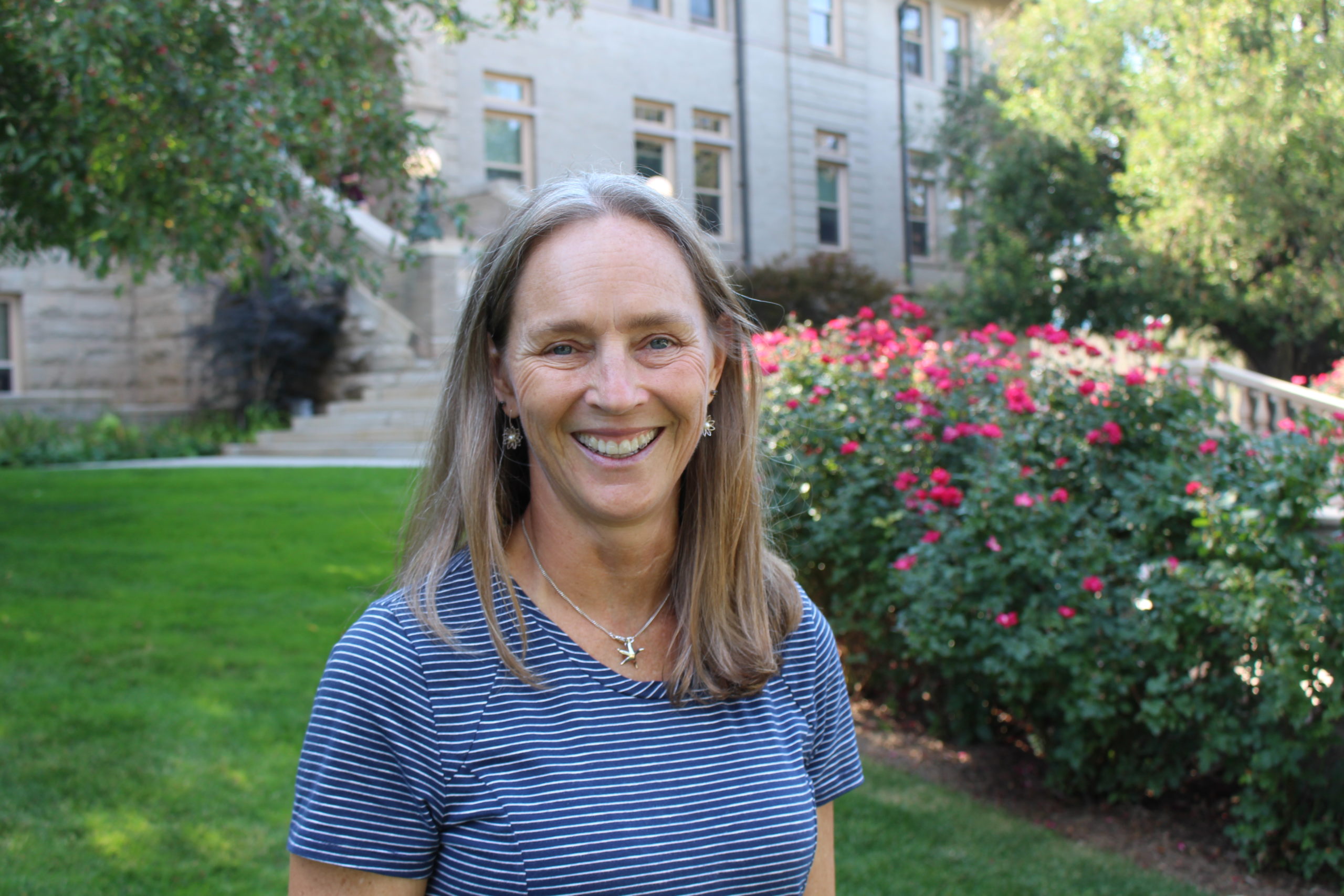
The one who wanted to attend Mines because of the M on the mountain
For those who grew up in the Denver metropolitan area, the M on Mt. Zion is a familiar sight, and many don’t give it a second thought as they drive through Golden. But for Elizabeth Kostiuk ’85, the hillside letter signaled where she wanted to be long before applying to college.
As a first-generation college student, all Kostiuk knew about higher education and life as a professional engineer was based on short conversations she had with high school teachers and counselors who knew her aptitude for math and science. “I didn’t even know what Mines was about,” Kostiuk said. “I had no idea what I wanted to do, and I had no idea what an engineer was, but I knew I wanted to go to Mines because of the M on the mountain.”
But her journey to Mines wasn’t a direct path. “I always wanted to get to Mines straight away, but I grew up in a very poor family and didn’t have the money to attend Mines, and I didn’t get any scholarships,” she said.
Fortunately, Fort Lewis College in Durango, Colorado, had a transfer partnership with Mines at the time, so her dream of studying under the M wasn’t completely out of reach. Kostiuk attended Fort Lewis for a couple of years and then was able to transfer her credits to Mines for the last years of her undergraduate education. But by the time she finally set foot on the Mines campus in her junior year, she was still at a disadvantage.
As a nontraditional student, Kostiuk hadn’t been able to participate in the same community-building experiences as other Mines students, such as the M Climb, going to sporting events or joining student organizations. She also had gotten married before transferring to Mines, which she felt limited the opportunities to get involved in many campus activities and take advantage of everything Mines had to offer.
It wasn’t until her senior year after she got divorced and was able to participate in field session that she really felt connected to the Oredigger community. “Field session was probably the best memory, the days I enjoyed the most,” she said. “I could have fun and just be me. I’m a geek at heart, and I was able to get into the chemistry and I loved it.”
And although she missed out on many Oredigger experiences as a student, Kostiuk is determined to make up for that now by returning to Mines, getting involved and giving back in any way she can. Over the course of her career, she was able to attend Career Day and help students with their resumes and interview skills, and now that she has retired and lives near campus, she frequently visits her alma mater as a volunteer and provides scholarship support for other first-generation students.
“I think I have a stronger affinity towards Mines in that I feel like I missed out on so much that maybe by staying engaged, I can make up for it,” she said. “I now have that opportunity to try to get involved and hopefully have the experiences I really didn’t get when I was an actual student.”
And the experience she participated in this year? Helping weigh students’ rocks at the start of the M Climb right under the M that always felt like home.
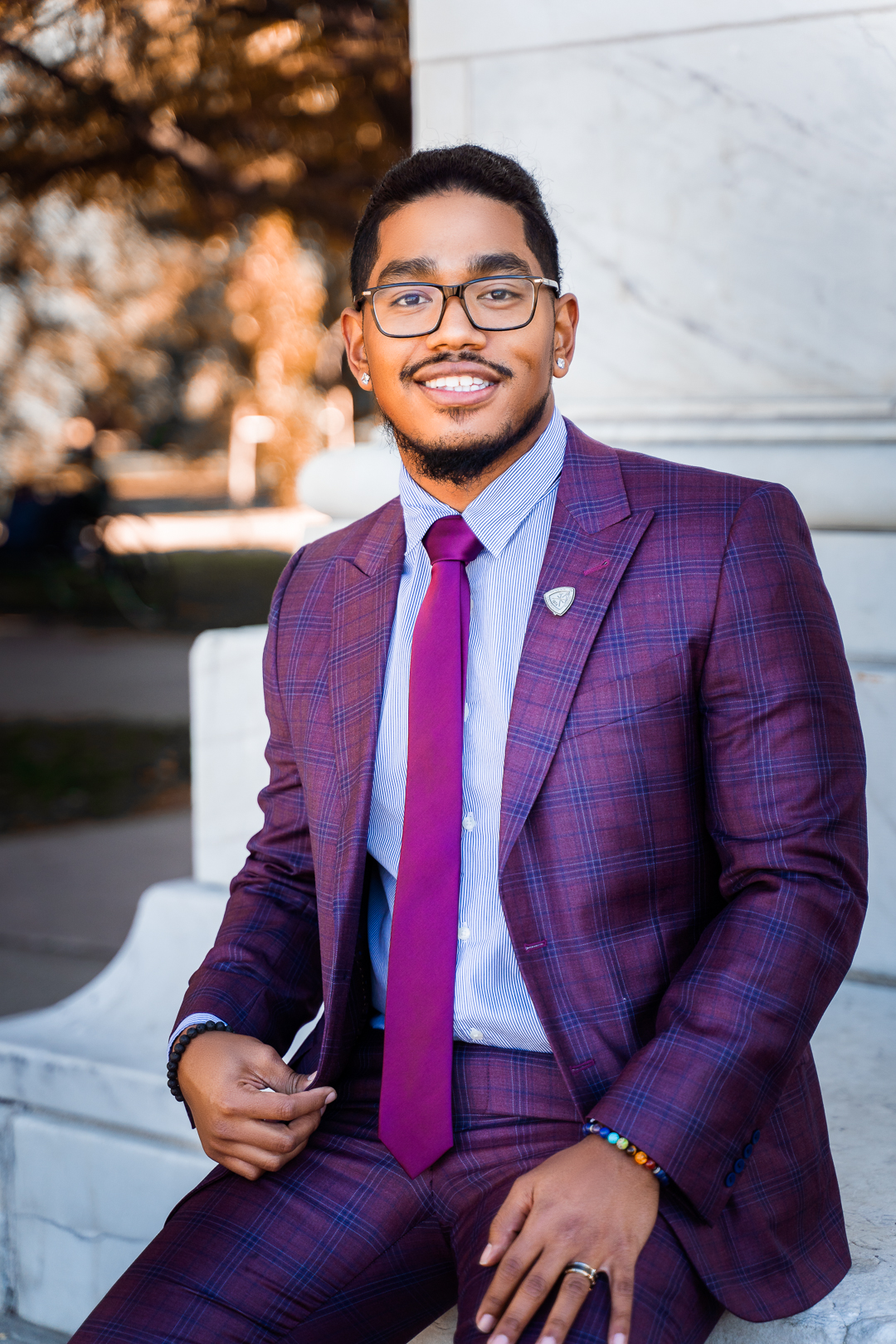
The one who is building a stronger network
Nahjee Maybin ’18 came to Colorado after completing his first undergraduate degree at Fort Valley State University in Georgia. He was interning with the Bureau of Reclamation, and they offered to fully fund another bachelor’s degree. He knew he wanted to pursue geophysics for his second degree, and with that opportunity on the table, it was a no-brainer for him to make that happen at Mines.
But going into Mines as a part-time transfer student instead of following the traditional path for most Orediggers meant that getting involved in campus life and taking advantage of the Oredigger experience took more of a conscious effort.
He first found a sense of being part of the Oredigger community within the Geophysics Department. “With the workload, you have to spend a lot of time on campus,” Maybin said. “You’re on campus into the late hours, so making connections within the Geophysics Department and building that community was key.”
With a group of like-minded people pursuing the same interests and working through the rigor of Mines’ academics together, Maybin was able to gain support and camaraderie that he hadn’t been able to fully embrace when he first started at Mines. He really saw that come to the forefront when participating in geophysics field session when he was around the same group of people for 12 hours a day for several weeks working in the field and in the lab and getting a sense of everyone’s shared interests. “Field camp was a really good bonding experience,” he said. “We’re all just nerds that like to have fun at the end of the day.”
But Maybin also wanted that sense of community to continue beyond graduation—particularly for Black alumni who typically don’t return to Mines or utilize the resources available to Mines graduates as much as other alumni groups. The summer after he graduated, Maybin pitched the idea of a Black alumni network to the Mines Alumni Board to help give Black alumni a better way to tap into all the benefits that come with having a Mines degree.
“The best part of graduating from Mines would be the network—you have a lot you can tap into, and I wanted to make sure that Black alumni were still active and present within the alumni community and use those resources,” he said.
And now as an entrepreneur, Maybin sees those opportunities as even more important for gaining better professional opportunities. “With entrepreneurship, you’re always trying to tap into more resources and the value of your connections,” he said. “You need to be able to tap into entrepreneurial resources at the school and you need to meet other alumni who do different things. It shows that those connections are actually tangible and not just talked about. Even on a job level, people get jobs because they know other alumni.”
While the Mines Black Alumni Network is still in its early stages, Maybin hopes it grows and helps create a pipeline from high school students to alumni who can all reap the benefits of being part of the Mines community. “At the end of the day, I hope this leads to diversifying the Mines community even more, because that was my main goal when I brought this to the alumni board,” Maybin said. “With different perspectives, you can get different outcomes, and by bouncing ideas off each other, you can actually get something that changes the status quo.”

The one who helps other first-generation students have the same opportunities
Ward Polzin ’84 grew up in Colorado, not too far from the Mines campus, but a college education wasn’t a given. Being from a blue-collar family, Polzin had limited savings to make any higher education dreams a reality. But with the skills and smarts to get into Mines and being an in-state resident, the university seemed attainable.
Luckily, Polzin was accepted into Mines on a full-ride scholarship, covering 100 percent of his tuition, and he received additional scholarships to cover his room and board expenses. “When I got accepted into Mines then got the scholarship, I was like, ‘Wow, this is life-changing’—and it really was,” he said.
But his Mines experience wasn’t all smooth sailing from there. Being a first-generation college student and coming from an underperforming high school where he hadn’t even taken a calculus class, Polzin was unprepared for the intensity and rigor expected from Orediggers. He had the skill to keep up in the classroom but felt underequipped as a first-year students to do as well as he knew he could. But that’s where the Oredigger community came in.
Polzin recognized he wasn’t going to be able to succeed at Mines without some help, and since he was taking the common courses all Mines students at the time took in their first year, there were many peers readily available to come together to support each other. “It was a shared experience of having to succeed here together,” he said. “I remember college really being super collaborative in that people just helped each other—both students and faculty.”
Those relationships formed in the classroom developed into some of Polzin’s closest friendships that have lasted through the years, and it’s all due to the small, unique community that comes together on the Mines campus. “Mines was just a small enough community,” Polzin said. “That’s why professors are here. That’s why students are here. It’s just a tight-knit community, and you find your own group of people one way or another. That still really resonates with me today.”
Now, Polzin ensures those same opportunities are available to other first-generation students through the Polzin Family Endowed Scholarship, similar to the scholarship he received to help him through his Mines experience. He and his wife, Karen, currently support three Mines students with a full-tuition scholarship, but for him, the relationship building is the most important part. He frequently gets to engage with the students he supports, learning about their backgrounds and aspirations and helping guide them through college in a way he didn’t experience when he was a student.
“I can still vividly remember being 18, and if I hadn’t received a scholarship, I just couldn’t have gone—it’s just that simple,” he said. “So knowing that if you can eliminate that insecurity and stress, then life can be a lot easier for the student. The ability to give that back to other people is just a thrill.”


